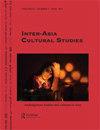三十年后重新思考 "接触区艺术":冷战与非殖民化之间的韩国
IF 0.4
4区 社会学
Q4 ANTHROPOLOGY
引用次数: 0
摘要
发表于《跨亚洲文化研究》(第 25 卷第 2 期,2024 年)本文章由计算机程序翻译,如有差异,请以英文原文为准。
Rethinking the “Arts of the Contact Zone” after thirty years: Korea between the Cold War and decolonization
Published in Inter-Asia Cultural Studies (Vol. 25, No. 2, 2024)
求助全文
通过发布文献求助,成功后即可免费获取论文全文。
去求助
来源期刊

Inter-Asia Cultural Studies
Multiple-
CiteScore
0.90
自引率
20.00%
发文量
22
期刊介绍:
The cultural question is among the most important yet difficult subjects facing inter-Asia today. Throughout the 20th century, worldwide competition over capital, colonial history, and the Cold War has jeopardized interactions among cultures. Globalization of technology, regionalization of economy and the end of the Cold War have opened up a unique opportunity for cultural exchanges to take place. In response to global cultural changes, cultural studies has emerged internationally as an energetic field of scholarship. Inter-Asia Cultural Studies gives a long overdue voice, throughout the global intellectual community, to those concerned with inter-Asia processes.
 求助内容:
求助内容: 应助结果提醒方式:
应助结果提醒方式:


